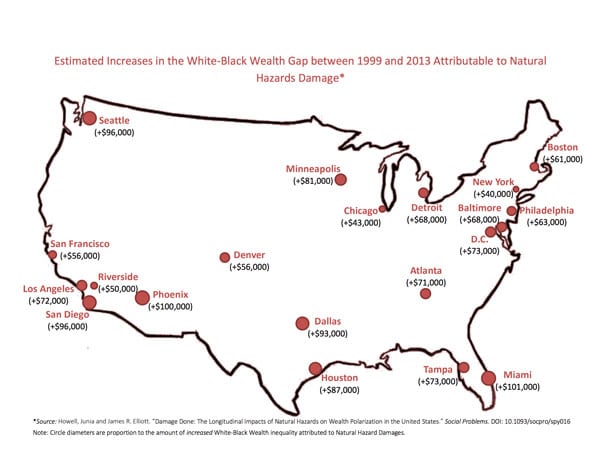
August 22, 2018; Colorlines
A new study in the journal Social Problems by Junia Howell of the University of Pittsburgh and James (Jim) Elliott of Rice University in Houston concluded that when natural disasters hit, people of color not only bear the brunt of the damage, they also aren’t able to bounce back to the same degree as whites. Disparities such as these are critical to examine in light of what appears to be a permanent increase in climate change-induced natural disasters.
“Last year, the United States suffered more than $260 billion in direct damages from natural disasters—mainly from hurricanes Harvey, Irma and Maria,” says Howell. “And there were also numerous wildfires, floods and tornadoes. Data show that since 2000, approximately 99 percent of counties in the United States have experienced significant damage from some type of natural disaster, with costs expected to increase significantly over coming years.”
Howell and Elliott’s study, which covered the 1999 to 2013 period, found that in counties with at least $10 billion in damages from natural disasters, whites gained an average $126,000 in wealth per household following recovery efforts. Yet wealth among blacks, Latinxs, and Asians decreased by $10,000–$29,000.
As Ayana Bird writes in Colorlines, two primary reasons are given for this disparity: “One is that whites tend to live in areas that have higher levels of reinvestment via infrastructure projects after natural disasters. Second, areas that receive more financial assistance from the Federal Emergency Management Agency (FEMA) have a greater increase in wealth inequality.”
Sign up for our free newsletters
Subscribe to NPQ's newsletters to have our top stories delivered directly to your inbox.
By signing up, you agree to our privacy policy and terms of use, and to receive messages from NPQ and our partners.
Elliott adds that the data show that “whites accumulate more wealth after natural disasters while residents of color accumulate less. What this means is wealth inequality is increasing in counties that are hit by more disasters.” According to a Rice University press release describing the study’s findings—to take just one example—in Harris County, Texas, which was hit by Category-3 Hurricane Rita in 2005 during the study period, the increase in the disaster-related wealth gap between white households and Black households was $87,000.
Howell, a report coauthor, tells Rice University that, “It’s unclear why more FEMA aid is exacerbating inequality.” But some other data in the study makes it clearer why this might be the case. Specifically, Howell and Elliott “found that after natural disasters wealth inequality also increases based on home ownership.”
Individuals who owned homes in counties that experienced high levels of natural disaster damage accumulated $72,000 more wealth on average than their counterparts in counties with few disasters. Renters, on the other hand, lost $61,000 in wealth on average relative to renters in counties with few natural disasters.
“Put another way, natural disasters were responsible for a $133,000 increase in inequality between homeowners and renters in the hardest hit counties,” Elliott says.
And, for a host of reasons that can be traced back to a history of redlining and many other discriminatory practices that starkly restricted Blacks and other people of color from becoming homeowners, Blacks are far more likely to be renters than whites. A recent report by Harvard University’s Joint Center for Housing Studies found that 43 percent of Blacks in the United States owned homes in 2017, compared to 72 percent for whites.
Another finding from the study shows that FEMA aid also sets in motion a process of private reinvestment that leads to “additional increases in wealth inequality beyond that attributed to the natural disasters themselves.” These data show that whites living in counties that received at least $900 million in FEMA aid accumulated an additional $55,000 in household wealth. Conversely, Blacks in similar counties accumulated $82,000 less wealth. Similarly, Latinxs accumulated $65,000 less on average, and others (mostly Asian Americans) accumulated $51,000 less.—Steve Dubb












